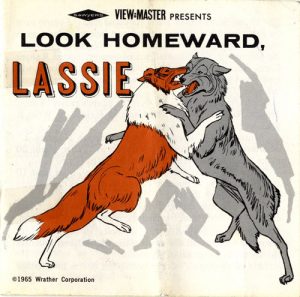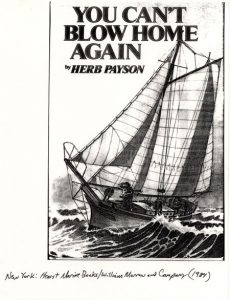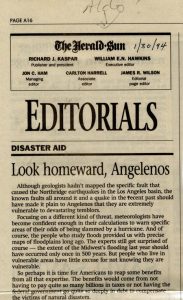“Mr. Stikeleather, may I give you one little illustration of what I think may have happened between myself and the people in Asheville? Have you ever tried to pass a man in the street and the moment you stepped to the right to go around him he would also step that way, when you step to the left, he would follow you, and so the thing would continue until it became funny and you both stood still and looked at each other and yet all the time all you were trying to do was to be friendly to each other and to give the other fellow a free passage?
“Or, better still, have you ever met some one that you knew you liked and you were pretty sure he felt the way about you and yet, figuratively speaking, you ‘got off on the the wrong foot’ with each other? Now I think that something of this sort may have happened between Asheville and myself.
“When I wrote ‘Look Homeward, Angel’ several years ago, I can honestly assure you I had no notion that the book would arouse the kind of comment and response and cause the kind of misunderstanding in my home town that it did do. I should like you to believe that I, myself, was just about the most surprised person in the world when I finally understood the kind of effect my book was having in Asheville….”
— From Thomas Wolfe’s letter responding to Asheville businessman J.G. Stikeleather (July 8, 1935)
[Paragraphing added.]
.
Tag: thomas wolfe
Wolfe escaped ‘noise… tumult… too many people’
On this day in 1937: Author Thomas Wolfe writes from New York to his mother in Asheville:
“Yes, I suppose there are more modern and up-to-date places around Asheville with electric lights, new beds, etc. but I did not have time to look for them and I honestly thought that the Whitson cabin was . . . the best place that I saw. . . .
“As to your own fears of loneliness — and not liking to be alone out in the country at night — I know of no way in which you can get peace and seclusion, and not get it, at the same time. What I need desperately at the present time is to get away from the noise and tumult of New York, to get away from towns and cities and, for a few weeks at least, to get away from too many people.”
“Look Homeward Lassie”: Thomas Wolfe Titles in Pop Culture
“I have to see a thing a thousand times before I see it once.”
– From Look Homeward, Angel by Thomas Wolfe
Since being published in the first half of the twentieth century, the titles of Thomas Wolfe’s novels Look Homeward, Angel and You Can’t Go Home Again have appeared thousands of times in all things Wolfe-related. The two iconic phrases, however, appear a surprising number of times in ways having nothing to do with Thomas Wolfe or his writings. They are found in cartoons, newspaper headlines, advertisements, magazine covers, children’s toys, etc. Below are a few examples from the Aldo P. Magi Collection on Thomas Wolfe of how Wolfe’s words have been used over the past 100 years. And while you’re browsing, consider joining lovers of all things Wolfe when they gather for the 36th annual meeting of the Thomas Wolfe Society in Chapel Hill on Friday.
“Look Homeward, Lassie,” View-Master reels, 1965
You Can’t Blow Home Again by Herb Payson, New York: Hearst Books/William Morrow and Company, 1984
“Look Homeward Angels,” Charlie’s Angels 10th Anniversary, People, 20 October 1986
“Look homeward, Angelenos,” The Herald Sun, 30 January 1994
“Sometimes, you can go home again.” Providence, aired on NBC, 1999-2002
Thomas Wolfe does double duty for Prof Koch
On this day in 1919: Professor Frederick Koch’s Carolina Playmakers debut with a trio of short plays in the Chapel Hill High School auditorium. Leading the bill: “The Return of Buck Gavin, A Tragedy of the Mountain People,” written by Thomas Wolfe, who also plays the part of Buck.
Among Prof Koch’s other notable early students: Paul Green, Jonathan Daniels and Frances Gray (Patton). By 1928 Brooks Atkinson of The New York Times will write that “what Professor Koch has accomplished, not only in Chapel Hill, but through the state, is nothing short of extraordinary.”
…
You can see costume items from “The Return of Buck Gavin” in the North Carolina Collection Gallery exhibit “Making a People’s Theatre: Proff Koch and the Carolina Playmakers,” from now until May 31.
Sorry, Thomas Wolfe….Sorry, Charles Frazier….
“…I clicked immediately, curious to see ‘the most famous book’ set in North Carolina. Would it be Thomas Wolfe’s ‘Look Homeward Angel?’ Charles Frazier’s ‘Cold Mountain’? Or maybe ‘A Long and Happy Life,’ the debut novel that vaulted Reynolds Price to national fame?
“Wrong, wrong and wrong. The most famous book set in North Carolina, according to Business Insider, is….”
— From “What’s the most famous book set in North Carolina?” by Pam Kelley at charlotteobserver.com
A somewhat similar undertaking from 2012: “The six most influential books in telling North Carolina’s history….Discuss!”
When Thomas Wolfe didn’t meet James Joyce
On this day in 1926: Thomas Wolfe and James Joyce share a tour bus visiting the battlefield at Waterloo but do not meet — Wolfe is too shy to say hello.
He will write soulmate Aline Bernstein that he found the episode “insanely funny…. I sat on the back seat making idiot noises in my throat and crooning all the way back through the forest.”
Kerouac’s adoration of Wolfe didn’t travel well
“Today Thomas Wolfe has largely fallen out of fashion, but to read him in the 1940s was a rite of passage for the sensitive young person, who found in the story of Eugene Gant all the loneliness, rage and yearning of American adolescence….
“As soon as he started reading Wolfe, Jack [Kerouac] was certain he had actually seen him with his own eyes on his own first walk across the Brooklyn Bridge in 1937. Whether or not this was the case, Wolfe would become an almost palpable presence in Jack’s imagination…. He would look to Wolfe when measuring his own achievement and defend him fiercely from detractors with more modernist tastes….
“[In 1944] he made a pilgrimage to Asheville, North Carolina, where by chance he met Thomas Wolfe’s brother [Fred?]. Jack later remembered little about this trip, which suggests that he may have been drinking heavily all through it. In his diary, he noted only that he had his fill of the Southland.”
— From “The Voice is All: The Lonely Victory of Jack Kerouac” by Joyce Johnson (2012)
The history of Coca-Cola, according to Thomas Wolfe
“Coca-Cola was the subject of increasing gossip in those years. Growing up in Asheville, North Carolina, Thomas Wolfe heard most of the rumors, but they only increased his taste for Coca-Cola. He immortalized the Great American Drink in this passage from the Great American Novel, ‘Look Homeward, Angel’:
” ‘Drink Coca Cola. They say [Asa Candler] stole the formula from an old mountain woman. $50,000,000 now. Rats in the vats. Dope at Wood’s [Drug Store] better. Too weak here [in New York City]. [Eugene Gant] had recently acquired a taste for the beverage and drank four or five glasses a day.’ ”
— From “For God, Country and Coca-Cola: The Definitive History of the Great American Soft Drink and the Company that Makes it” by Mark Pendergrast (1993)
Literary pantheon: One Wolfe out, one Wolfe in?
“I am old enough to remember when Thomas Wolfe seemed secure in the pantheon of 20th-century American writers, the equal, nearly, of Faulkner and Fitzgerald and Hemingway. He is gone from the pantheon today, and I doubt that Tom Wolfe gets asked about his kinship to Thomas Wolfe anymore.
“The obscurity of Thomas is an odd but impressive testament to the magnitude of Tom’s fame and, more important, the vastness of his literary achievement over a career spanning a half-century.”
— From “The Right Wolfe” by Andrew Ferguson in Commentary (November 2012)
Tom told George Plimpton he ignores Thomas’s “fluctuations on the literary stock market.”
Memoirist Dylan was ‘hiding behind a wall of Wolfe’
“Given [Jonah] Lehrer’s offenses, it is interesting that among the trickery in ‘Chronicles’ [Bob Dylan’s 2004 memoir] are misattributions. In one section… Mr. Dylan appeared to take a phrase from the letters of Thomas Wolfe and put it in the mouth of U2’s Bono.”
— From “Freewheelin’: Bob Dylan, Jonah Lehrer and the Truth,” an op-ed piece by David Kinney in the New York Times (August 2)
Dylan, Wolfe and Bono? Wow!
What follows is cut-and-pasted from the wildly obsessive Dylan fan site swarmuth.blogspot.com:
Dylan takes on the voice of Wolfe himself when describing his frame of mind and his interactions with producer Daniel Lanois while recording the album “Oh Mercy” in New Orleans. Here are a few examples.
Chronicles: Volume One, pp. 217 – 218:
There had been a clashing of spirits at times, but nothing that had turned into a bitter or complicated struggle.
The Letters of Thomas Wolfe, p. 395
You say nothing of the bitter and complicated struggle which has been going on between two people for two years.
Chronicles: Volume One, p. 221:
I try to use my material in the most effective way. The songs were written to the glory of man and not to his defeat, but all of these songs added together doesn’t even come close to my whole vision of life. Sometimes the things that you liked the best and that have meant the most to you are the things that meant nothing at all to you when you first heard or saw them. Some of these songs fit into that category. I suppose all these things are simple, matter of fact enough.
On the record, I had to make spur of the moment decisions which might not have had anything to do with the real situation.
The Letters of Thomas Wolfe, p. 343:
You mention the fact that I have worked hard in an effort to learn how to use my material in the most effective way.
The Letters of Thomas Wolfe, p. 341:
…that the story has been written to the glory of man and not to his defeat.
The Letters of Thomas Wolfe, p. 343:
That is that I should like my work to be of one piece with all my life, and that to me the labor of writing does seem to be united to a man’s whole vision of life…
The Letters of Thomas Wolfe, p. 368:
To me it is and always has been the most difficult kind of reading, just as it is the most difficult of writing, and the poems that I have liked the best and that have meant the most to me are those that meant nothing at all to me when I first read them.
The Letters of Thomas Wolfe, p. 389:
All these things I suppose are simple and matter-of-fact enough, but all the strangeness and mystery of time and chance and of the human destiny is in them for me and they seem wonderful.
The Letters of Thomas Wolfe, p. 395:
What you did not say in your story, however, and what you know to be true, is that the Guggenheim fellowship and this sudden spur-of-the-moment decision had nothing to do with the real situation.
Chronicles: Volume One, p. 221:
That being said, I had wholehearted admiration for what Lanois did. A lot of it was unique and permanent. Danny and I would see each other again in ten years and we’d work together once more in a rootin’ tootin’ way.
The Letters of Thomas Wolfe, p. 315:
…I’d like to say to you that he has the most genuine and whole-hearted admiration for your genius and power as a novelist – he feels, as I do, that your talent is unique and permanent, that there is no one like you, and that if they read any of our books in the future they will have to take account of you.
The Letters of Thomas Wolfe, p. 226:
…rootin’, tootin’, shootin’, son-of-a-gun…
The Letters of Thomas Wolfe, p. 644:
…rootin, tootin, shootin, son of a gun…
Much of Chronicles: Volume One is constructed in this rootin’, tootin’ manner, from dozens of different sources. In this particular stretch Dylan appears to be warmly letting you in, but he’s not doing that at all. It’s a freeze-out. He’s hiding behind a wall of Wolfe.





